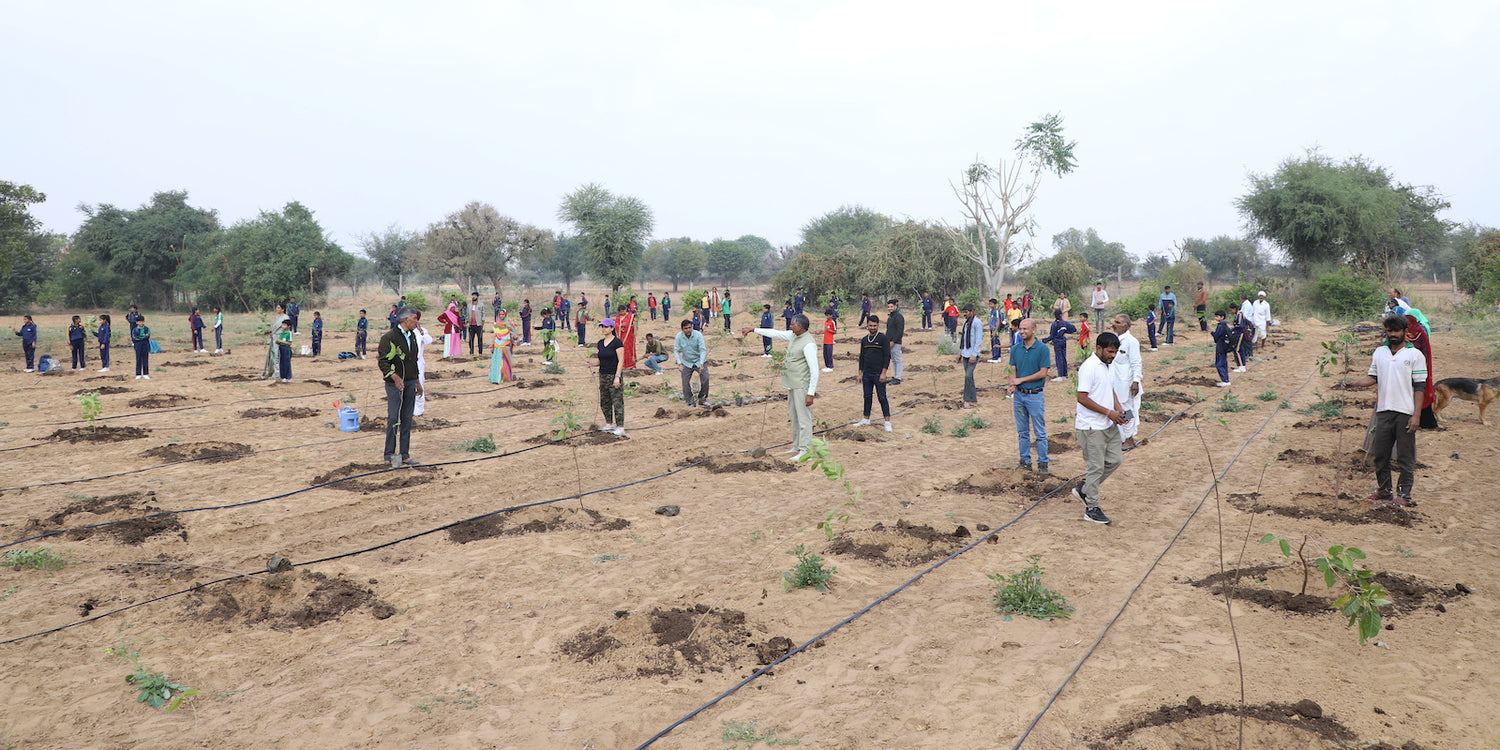Best Native Trees to grow near Chennai: Cityscape Flourishment
Nestled along the azure shores of the Bay of Bengal, Chennai boasts a rich diversity of native trees that adorn its streets, parks, and gardens. As th Read more
Connect with us
-
👥 Corporates
If you are looking for:
- 🌲 Tree Plantation Events
- 📊 CSR Projects
📧 corporate@growbilliontrees.com
📞 +91 9699723523
💬 +91 9325931304 WhatsApp (Only)
🕒 Mon - Sat | 10am - 7pm IST
-
🧩 Tree Plantation NGOs
If you are looking for:
- 💰 Financial Assistance
- 🤝 Operational Support
📧 support@growbilliontrees.com
📞 +91 9699723523
💬 +91 9325931304 WhatsApp (Only)
🕒 Mon - Sat | 10am - 7pm IST
-
🌼 Individuals
If you are looking for:
- 👥 Group Tree Plantation Drive
- 🌳 Bulk Tree Plantation
📞 +91 9699723523
💬 +91 9325931304 WhatsApp (Only)
🕒 Mon - Sat | 10am - 7pm IST
Plantation Gallery
Trending
Trees for Corporates
Best Native Trees to grow near Chennai: Cityscape Flourishment
Nestled along the azure shores of the Bay of Bengal, Chennai boasts a rich diversity of native trees that adorn its streets, parks, and gardens. As the city embraces sustainable development, cultivating native trees becomes essential to enhance Chennai's greenery and preserve its ecological heritage. Here, we delve into a diverse array of native trees ideal for growing near Chennai, each contributing unique benefits to urban environments.
Banyan (Ficus benghalensis): With its expansive canopy and aerial roots, the banyan tree provides shade and sanctuary, fostering biodiversity in Chennai's urban spaces.
Neem (Azadirachta indica): Revered for its medicinal properties, the neem tree's resilient nature and pest-repelling qualities make it a valuable addition to Chennai's green cover, contributing to a healthier environment.
Peepal (Ficus religiosa): Symbolizing spiritual significance, the peepal tree's broad leaves and tranquil presence offer sanctuaries for contemplation amidst Chennai's bustling streets.
Indian Rosewood (Dalbergia sissoo): prized for its sturdy timber and elegant foliage, the Indian rosewood tree stabilizes soil near water bodies and adds aesthetic value to Chennai's landscapes.
Indian Laburnum (Cassia fistula): Adorned with clusters of golden-yellow flowers, the Indian laburnum tree brightens Chennai's streetscapes and attracts pollinators, enhancing urban biodiversity.
Jamun (Syzygium cumini): Bearing succulent purple fruits, the jamun tree provides nutritious snacks for Chennai's residents and supports local wildlife, fostering a deeper connection to nature.
Mango (Mangifera indica): Beyond its delicious fruit, the mango tree's lush foliage and shade provide relief from Chennai's tropical heat, enriching the city's green cover.
Coconut (Cocos nucifera): With its iconic silhouette and versatile uses, the coconut palm graces Chennai's coastal areas and offers edible fruits, contributing to the city's cultural and culinary heritage.
Rain Tree (Samanea saman): Known for its expansive canopy and nitrogen-fixing capabilities, the rain tree enriches Chennai's soil and provides habitat for urban wildlife.
Indian Almond (Terminalia catappa): With its glossy leaves and decorative fruits, the Indian almond tree enhances Chennai's parks and gardens while offering shade and beauty to residents.
Indian Cork Tree (Millingtonia hortensis): Fragrant and ornamental, the Indian cork tree adds elegance to Chennai's landscapes and provides habitat for birds and insects, contributing to urban biodiversity.
Flame-of-the-Forest (Butea monosperma): With its fiery orange blooms, the flame-of-the-forest tree adds color and vitality to Chennai's streetscapes, heralding the arrival of spring.
Indian Coral Tree (Erythrina variegata): Adorned with vibrant red flowers, the Indian coral tree attracts pollinators and serves as a focal point in Chennai's urban parks and gardens.
Indian Gooseberry (Phyllanthus emblica): With its tangy fruits and medicinal properties, the Indian gooseberry tree thrives in Chennai's tropical climate, offering both sustenance and shade.
Indian Beech (Pongamia pinnata): Valued for its oil-rich seeds and nitrogen-fixing capabilities, the Indian beech tree supports sustainable agriculture and urban greening efforts in Chennai.
Indian Laurel (Terminalia elliptica): Resilient and adaptable, the Indian laurel tree withstands urban stresses and contributes to Chennai's green infrastructure, purifying the air and providing habitat for wildlife.
Cluster Fig (Ficus racemosa): With its edible figs and dense foliage, the cluster fig tree enriches Chennai's biodiversity and serves as a food source for birds and mammals.
Indian Mast Tree (Polyalthia longifolia): Tall and graceful, the Indian mast tree adds vertical interest to Chennai's skyline while offering shade and visual appeal to urban landscapes.
Indian Cork Fig (Ficus infectoria): With its fig-bearing branches, the Indian cork fig tree supports Chennai's ecosystem by providing food for birds and bats.
Mahua (Madhuca longifolia): Cultural and ecological significance converge in the mahua tree, which produces edible flowers and supports biodiversity in Chennai's urban green spaces.
Indian Sandalwood (Santalum album): prized for its fragrant wood and essential oil, the Indian sandalwood tree enriches Chennai's landscapes with its aromatic presence.
Cannonball Tree (Couroupita guianensis): Unique and exotic, the cannonball tree adds intrigue to Chennai's botanical gardens and parks with its spherical fruits and fragrant flowers.
Wild Almond (Sterculia foetida): With its large leaves and colorful fruits, the wild almond tree attracts birds and small mammals, contributing to Chennai's urban biodiversity.
Wild Mango (Mangifera sylvatica): A wild counterpart to its cultivated cousin, the wild mango tree offers shade and sustenance to Chennai's residents and wildlife.
Indian Gooseberry (Emblica ribes): Similar to Phyllanthus emblica, Emblica ribes thrives in Chennai's climate, providing medicinal benefits and greenery to urban environments.
Indian Beechwood (Pongamia glabra): Fast-growing and nitrogen-fixing, Pongamia glabra supports Chennai's reforestation efforts and urban greening initiatives.
Indian Coral Bean (Erythrina indica): Resilient and drought-tolerant, the Indian coral bean tree adds color and resilience to Chennai's urban landscapes.
Indian Fir (Abies spectabilis): Though native to the Himalayas, the Indian fir adapts well to Chennai's climate, offering evergreen foliage and a touch of mountainous charm to urban parks and gardens.
Indian Cork Oak (Quercus serrata): Durable and long-lived, the Indian cork oak tree withstands urban pressures while providing habitat for wildlife and enhancing Chennai's greenery.
Indian Laurel Fig (Ficus microcarpa): Versatile and adaptable, the Indian laurel fig tree adds shade and ornamental value to Chennai's urban forests and green spaces.
Growbilliontrees: In the pursuit of greening Chennai's urban landscape, initiatives like Growbilliontrees play a pivotal role. By collaborating with NGOs, corporates, and other stakeholders, Growbilliontrees provides the necessary technology, knowledge, and tools to optimize, organize, and monitor tree plantation activities. Through their concerted efforts, Chennai can embark on a transformative journey towards a greener, healthier, and more sustainable future.
As Chennai continues to evolve, let us not forget the importance of preserving and nurturing its native trees. By embracing these botanical treasures and leveraging the expertise of organizations like Growbilliontrees, we can ensure that Chennai remains a vibrant, green city for generations to come.
Evergreen Trees
Evergreen trees are indispensable for Chennai's urban greenery, providing a constant source of lush foliage and greenery throughout the year. Species like Pongamia and Indian Laurel not only offer shade but also contribute to the city's aesthetic appeal by maintaining their foliage even during the hottest months, creating a refreshing oasis in Chennai's bustling streets.
Fast-Growing Trees
In a city known for its rapid development, fast-growing trees like Rain Tree and Copper Pod are essential for quickly establishing green cover in Chennai's urban areas. Their swift growth rate ensures that they can provide shade and improve air quality in a relatively short span of time, making them invaluable assets for urban greening initiatives aimed at enhancing the city's livability.
Drought-Tolerant Trees
Given Chennai's arid climate and limited water resources, drought-tolerant trees such as Neem and Indian Beech are crucial for sustaining urban greenery in the face of water scarcity. These resilient species can thrive in dry conditions with minimal irrigation, helping to conserve water and maintain green spaces even during periods of drought.
Fruit-Bearing Trees
Introducing fruit-bearing trees like Mango and Jackfruit into Chennai's urban landscape not only adds to its visual appeal but also provides a sustainable source of fresh produce for local residents. These trees attract birds and wildlife, promoting biodiversity and creating a connection to nature within the city.
Native Flowering Trees
Native flowering trees such as Indian Coral Tree and Bauhinia bring bursts of color and fragrance to Chennai's streets and parks, enhancing the city's beauty and attracting pollinators. Their seasonal blooms add vibrancy to the urban landscape and provide a sense of joy and tranquility for residents and visitors alike.
Shade Trees
Shade trees are essential for providing relief from Chennai's scorching heat and creating comfortable outdoor spaces for recreation and relaxation. Species like Rain Tree and Gulmohar, with their broad canopies and dense foliage, offer much-needed shade, making them invaluable for enhancing the quality of life in Chennai's urban areas.
You may like
Corporate Plantations
FAQ
What are the best native trees to grow near Chennai for urban greenery?
Chennai's urban environment flourishes with native trees like the Indian Coral Tree (Erythrina indica), Indian Laburnum (Cassia fistula), Indian Silk Cotton Tree (Bombax ceiba), and Neem (Azadirachta indica). These indigenous species are well-adapted to Chennai's climate and soil conditions, providing shade, biodiversity, and ecological resilience.
How can I ensure the successful growth of native trees in Chennai's urban environment?
Successful tree growth in Chennai requires proper site selection, regular watering, appropriate fertilization, and protection from pests and diseases. Choosing native species that thrive in Chennai's specific environmental conditions, such as high temperatures and periodic droughts, is essential for their long-term health and vigor.
Are there any specific challenges in growing native trees in Chennai's urban areas?
Chennai's urban areas face challenges such as water scarcity, soil salinity, and urban heat island effects. However, with proper care, community participation, and sustainable urban planning, native trees can thrive in Chennai, offering numerous environmental, social, and economic benefits.
What are the benefits of planting native trees near Chennai?
Planting native trees near Chennai yields various benefits, including improving air quality, reducing urban heat island effects, enhancing biodiversity, and providing habitat for native fauna. Additionally, native trees contribute to soil conservation, water recharge, and climate resilience, making them invaluable assets for sustainable urban development.
How can I get involved in native tree planting initiatives in Chennai?
You can participate in native tree planting initiatives in Chennai by volunteering for tree planting events, supporting local environmental organizations, or contributing to initiatives like ours at GrowBillionTrees.com through donations or sponsorship. Your involvement plays a crucial role in creating a greener and more livable Chennai.
What is the impact of urban greenery on the quality of life in Chennai?
Urban greenery in Chennai positively impacts the quality of life by reducing air pollution, mitigating heat stress, enhancing aesthetics, and promoting physical and mental well-being. Additionally, urban green spaces provide opportunities for recreation, social interaction, and biodiversity conservation, enriching the city's cultural and ecological fabric.
Are there any government regulations or guidelines for planting native trees in Chennai?
Yes, there are government regulations and guidelines for planting native trees in Chennai, including species selection criteria, planting techniques, and maintenance standards. Compliance with these regulations ensures the successful establishment and management of native trees in the urban landscape.
How does GrowBillionTrees.com contribute to native tree planting efforts in Chennai?
GrowBillionTrees.com actively contributes to native tree planting efforts in Chennai by organizing tree planting campaigns, partnering with local stakeholders, and raising awareness about the importance of native trees for urban greening. Through our initiatives, we aim to create a more resilient, sustainable, and vibrant Chennai for present and future generations.























